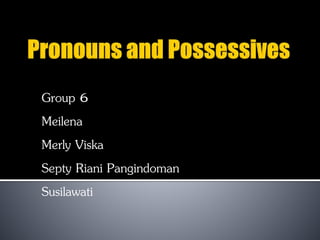
Group 6 Pronouns Guide
- 1. Group 6 Meilena Merly Viska Septy Riani Pangindoman Susilawati
- 2. Personal Pronoun Possessive Pronoun The possessive (genetive) Function of The possessive forms Reflexive Pronoun Indifinite Pronoun Demonstrative Pronoun
- 3. Subject and object forms of the personal pronoun in English: Both subject and object forms are used to refer to noun phrases which have been previously mentioned or which can be inffered from the context. Subject Object Singular Plural Singular Plural 1st person I We Me Us 2nd person You You You You 3rd person She/He/It They Her/him/it them
- 4. Subject pronouns function as subject in sentences. Amos felt sad. He wanted to go. (i.e., Amos wanted to go.) Object pronoun function as direct or indirect objects, or as objects of prepositions. Joan entered the room. Anthony gave her the message. (i.e., Anthony gave Joan the message.)
- 5. The two functions of possessive pronouns: They can serve as a possessive determiner before a noun phrase. This is Sheila’s book This is her book They can replace the NP inflected for possession. This book is Sheila’s This book is hers
- 6. Two different forms of possesive pronouns. Determiner Function Pronominal Function Singular Plural Singular Plural 1st person My Our Mine Ours 2nd person Your Your Yours Yours 3rd person Her/his/its Their Her/his Theirs
- 7. The two other major ways of signaling possession in English By inflecting regular singular noun and irregular plural nouns not ending in s with ‘s: The baby’s crib The women’s room The mice’s house By adding an apostrophe (‘) after the s ending of regular plural nouns and singular forms that already end in the sound s The boys’ trip Kansas’ farmlands All doctors’ advice
- 8. Another way is by using the of possessive form where the possessor and things possessed are inverted. The man’s name The name of the man The book’s price The price of the book
- 9. The use of the ‘s form: The human head noun (animate); Martine’s husband The human head noun when the modifier noun is long; He’s the son of the well-known politician was preffered He’s the well known politician’s son Double possessives; Hank’s brother’s car Nouns of special interest to human activity; The game’s history Natural phenomena; The earth’s gravity
- 10. The use of the of form: Non human head noun the end of the road The head noun was inanimate The train’s arrival was delayed was preferred over The arrival of the train was delayed Preferred in all other instances, most commonly with lifeless things He stood at the bed’s foot was preffered over He stood at the foot of the bed
- 11. Description a debtor’s prison = a prison for debtors Amount/Quantity one month’s rent = the amount of rent for a month Relationship/Association John’s roomate = the person who rooms with John Part/Whole my brother’s hand my father’s eyes Origin Agent shakespeare’s tragedies = the tragic plays that shakespeare wrote
- 12. The reflexive pronouns form: Singular Plural 1st person Myself Ourselves 2nd person Yourself Yourselves 3rd person Herself, himself, itself Themselves
- 13. The so-called indifinite pronouns occur as a compound forms: Body and one mean “person” in general. Thing refers to an inanimate or abstract concept, or to entity no definitely identifiable as a person. All the compound indefinite pronouns require singular verb. Everyone has his own way of doing things. Some Any No Every -body Somebody Anybody Nobody Everybody -one Someone Anyone No one Everyone -thing Something Anything Nothing Everything
- 14. The demonstrative determiners of English vary along two dimensions; distance and number. The demonstrative determiners of English can also function as pronouns and represent an entire NP. Please fill these forms out or simply Please fill these out Number Distance Singular Plural Near This These Far That Those
- 15. (s) (ones) Another and other can function as singular and indifinite, e.g: You’ve had only one cookie would you like another (one) ? The other can function as definite singular pronoun, e.g: You’ve only eaten one of the two Aren’t you going to eat the other (one)? I gave you. Others, Other ones, the others and the other ones can functions as either an indifinite or a definite plural pronoun, e.g: The apples are sour. I have bought at this store have been sweeter The red apples are sweet. The are sour.
